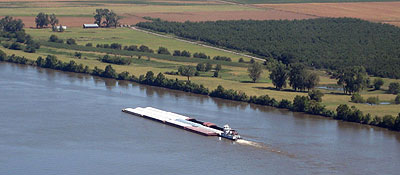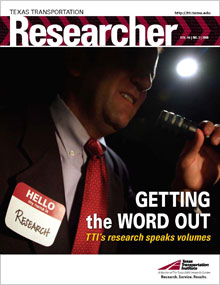Hint: it isn’t oil…
In the not-too-distant future, water might just prove more valuable to our national transportation system than gasoline.
Rising gas prices are making it harder for truckers to make ends meet. Shipping goods in general is becoming ever more expensive, and those costs are being passed on to consumers. In short, the old way of moving goods to market is straining family and industry budgets alike.
For some goods, our nation’s waterways offer a transportation solution—driving down shipping costs through competition, getting more vehicles off the roads, enhancing safety and improving air quality. But in order to compete, ports need every advantage they can get, and that means industry professionals working together to advance waterways as a transportation mode.
The Texas Ports and Waterways Conference, a three-day event, is designed to do just that. The Texas Department of Transportation (TxDOT) began holding the conference in the mid-1990s. In 2004, the Texas Transportation Institute (TTI) stepped in to host the conference, and now TxDOT and TTI sponsor the conference in alternate years.
 Held in Galveston July 23-25, 2008, this year’s conference focused on providing practical, timely information on port facilities in Texas. Presentations addressed current legislation, infrastructure financing, the energy situation in Texas and the effects of climate change on ports. The Port of Galveston helped TTI host the event and hosted a reception.
Held in Galveston July 23-25, 2008, this year’s conference focused on providing practical, timely information on port facilities in Texas. Presentations addressed current legislation, infrastructure financing, the energy situation in Texas and the effects of climate change on ports. The Port of Galveston helped TTI host the event and hosted a reception.
“The conference gets government entities together with ports and waterway users,” says Jim Kruse, the director of TTI’s Center for Ports and Waterways. “It also informed waterway users of current issues that could affect them.”
Each past conference has brought together approximately 100 industry professionals, including government officials, port authorities, engineers, consultants, carriers, shippers, academia and others who deal with the development and management of port facilities in Texas. The format includes presenters who allow extensive question-and-answer sessions to encourage discussion of the subject area. The conference is designed to also allow time for networking and interacting with speakers, maximizing that personal contact that keeps key stakeholders informed of issues relevant to waterways.
“The quality of attendees that the conference attracts is outstanding,” says John Roby, the director of customer service for the Port of Beaumont. “You can have a CEO at the same table with shippers, transportation people, consultants, academia—our industry is not focused on one area. There are a lot of different people involved in the marine and maritime industry, and the conference attracts everyone we need to talk to. I learn not only from the presenters but also from other attendees.”
And the attendees have a lot to teach TTI as well. “The conference helps TTI and the transportation community find out what areas we need to research,” says Kruse. “We get good feedback on what issues we can address in our research to help ports and waterways in the state of Texas.”
